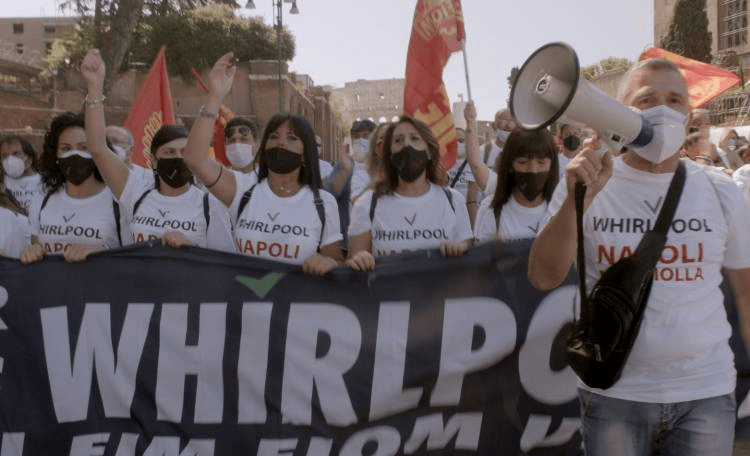
Che cos’è la digital literacy, e come si sta muovendo l’Europa per l’alfabetizzazione digitale dei suoi cittadini? Le diverse generazioni coinvolte condividono problemi simili.
A “naïve” acquisition by the Dutch HR colossus sank one of the largest recruiting sites with the complicity of private equity fund Apollo. And now, according to management, while American employees will be protected, their European counterparts will be left to their respective states: an exclusive account from an executive

“There is widespread anger at various levels.” In the words of Matteo Nicolò, International Sales Director for Monster France and the employees’ spokesperson in this dispute, there isn’t just frustration, but the bitter taste of betrayal.
The story of the end of European operations for Monster, once a pioneer in online recruiting, is a human and financial drama that sees its employees trapped between the maneuvers of two giants: the Dutch human resources behemoth Randstad and the private equity fund Apollo Global Management. What was presented as “a new dawn” has devolved into an unscrupulous liquidation, leaving European workers to wonder how the “human forward” values touted by Randstad can coexist with the total abandonment they are now facing.
To understand today’s anger, one must step back to 2016.
This was the year that Randstad, a global leader in temporary staffing, acquired Monster for $429 million—a move that, from the outset, seemed rather naïve to industry insiders. The reason was simple: Monster’s main clients, those who filled its pages with job listings, were the major employment agencies like Adecco, Manpower, GiGroup, and other direct selection firms—all direct competitors of Randstad.
Despite assurances from the new owner about the platform’s neutrality and guarantees of privacy protection, advertisers withdrew one by one, unwilling to hand their data over to a rival.
The subsequent management, in the words of Matteo Nicolò, was disastrous: “Randstad never understood our business. They insisted on replacing strategic executives with inadequate managers, and over the course of eight years, our revenue was slashed by two-thirds in a growing market.” Years of financial bleeding had set the stage for the collapse.
In July 2024, Randstad announced the move that would seal Monster’s fate: the creation of a joint venture, a strategic alliance, with the American private equity fund Apollo Global Management. Another struggling company from Apollo’s portfolio, CareerBuilder, was also merged into the deal.
In this transaction, Randstad ceded control, retaining a substantial—yet minority—stake of 49%.
The premises were grim. CareerBuilder came to the alliance burdened with $135 million in debt and plummeting revenue. Apollo, true to the typical speculative private equity model, focused not on investment but on dismantlement, quickly selling off the group’s most profitable and technologically advanced assets, such as Broadbean and Textkernel — two gems specializing in recruiting technologies. In contrast, Monster had entered the acquisition debt-free.
Randstad, for its part, initially tried to keep the ship afloat: at the time of the merger, it injected a $19.6 million loan to ensure liquidity, followed by another $20 million in February 2025. But these were mere bandages on a wound too deep.
Using the “excuse of macroeconomic instability“, the castle crumbled: on June 5, Apollo and Randstad announced they would no longer inject money, triggering the decision for an “accelerated sale” of all divisions and a massive destruction of value.
It is at this point that the paths for American and European employees tragically diverge.
To manage the sale in a protected environment, the U.S. joint venture was placed under Chapter 11 protection. For those unfamiliar with financial terms, Chapter 11 is not a total bankruptcy but a controlled restructuring. It’s as if a company enters intensive care: the court grants it a pause from its debts to allow it to continue operating, reorganize, and present a plan to return to health, repaying creditors over time. It is a tool designed to save the company and, with it, the jobs.
For the European branches, however, a far more dramatic scenario is unfolding, akin to total liquidation or bankruptcy. In this case, there is no salvation. The company is declared dead, ceases all activity, and a liquidator sells everything that remains to pay creditors. For Monster’s European employees, the cruel twist is that this liquidation will occur without even the protections of a formal procedure: funds from the US simply stopped arriving, leaving the European companies at the mercy of their states, which will have to provide for their protection with public money.
All of this is happening in great haste, without allowing Monster’s management team to even evaluate, for example, a working buyout, which would have at least permitted—albeit on a less accelerated timeline—a more virtuous acquisition by the employees, perhaps with the support of a conscientious investor.
In June, the sale of the group’s three main divisions was announced: MMP (Military.com), MGS (Monster Government Solutions), and the heart of the business, the job board Monster.com. The fate was sealed on July 18 in New York, during the auction for the site itself. The winner was an American company, BOLD, which secured the package for a mere $28.6 million — a paltry sum for such a well-known brand.
But it is a clause in the agreement that marks the final condemnation for Europe: BOLD immediately declared that it would not take on the international business. Not only that: the deal includes the acquisition of all global domains (monster.fr, monster.de, monster.it, etc.) at bargain-bin prices. This means BOLD will snatch up the brand worldwide, effectively preventing any potential local buyer in Europe from acquiring the operations and continuing to operate under the “Monster” name. Furthermore, Europe will not see a single cent from the sale of its domains.
Besides, it had been clear since June that things were looking bleak for Europe, when the CEO of the joint venture and former CEO of CareerBuilder, Jeff Furman, admitted that for the European subsidiaries, there had simply been “no offers.”
The insult to European employees, clients, and candidates continued with the shutdown of all European Monster sites without any prior communication. Since July 30, clients can no longer even access the services they purchased.
While the American procedure is shielded with millions of dollars spent on legal consultants, the human drama unfolds in Europe.
“The employees, and not just ‘the business,’ are being liquidated” writes Matteo Nicolò in an email to Randstad’s top executives. Torn-up contracts, broken severance agreements, and, above all, the nightmare of not receiving a salary and losing health coverage.
“Monster employees will remain in limbo WITHOUT A SALARY for several months, leaving them in a highly precarious situation” Nicolò denounces. “French employees will also lose their health insurance overnight, despite some of them undergoing serious medical treatments”.
The anger boils over when the workers discover that, while they are being denied everything, a $1.2 million bonus has been budgeted for a small group of managers to reward the “success” of the sale. In the letter sent to the board, the question lands like a punch to the gut: “Do you consider this ethical?“.
Randstad’s response to the desperate calls for help is ice-cold. The CEO, Sander van’t Noordende, replies with a terse sentence: “I remind you that we are a minority shareholder“. This position is reiterated by all contacted managers, including Chief Human Resources Officer Myriam Beatove Moreale and Randstad’s General Counsel Fiona Van Lede, who defended Randstad’s actions. But for the employees, this logic is unacceptable.
“Randstad owned 100% of Monster until nine months ago,” retorts Matteo Nicolò, pointing out that the company still has three members on the joint venture’s board of directors. The feeling is that the structure was deliberately created to offload responsibility.
As Nicolò put it: “On one side, we have one of the richest private equity firms, Apollo, and on the other, the world leader in temporary staffing, Randstad, and they are asking taxpayers to pay for a handful of employees?“.
Randstad’s final offer sounds almost like an insult: no outplacement plan. Furthermore, “laid-off employees can apply,” as if it were a kind concession, “to open positions within the group, but any application will follow the standard recruitment process without privileges”, as specified by Isabelle Callebaut, Global HR Leader.
An empty gesture for those who feel betrayed by a company that, as Matteo Nicolò recalled, loves to quote the values of its founder, Frits Goldschmeding: “Respect for people and social responsibility.” A contradiction that Nicolò summarizes with bitter clarity: “Nobody forced them to write all these slogans, but at least they should live up to them“.

Che cos’è la digital literacy, e come si sta muovendo l’Europa per l’alfabetizzazione digitale dei suoi cittadini? Le diverse generazioni coinvolte condividono problemi simili.

Che ci sembri una novità non vuol dire che lo sia: ripercorriamo la storia dell’apprendimento a distanza, le forme che ha assunto nel 2020 e quelle che potrebbe assumere in futuro.

La vicenda degli operai Whirlpool di Napoli raccontata dal documentario “Via Argine 310” di Gianfranco Pannone: le testimonianze della lotta con il regista, lo scrittore Maurizio De Giovanni e i rappresentanti degli operai